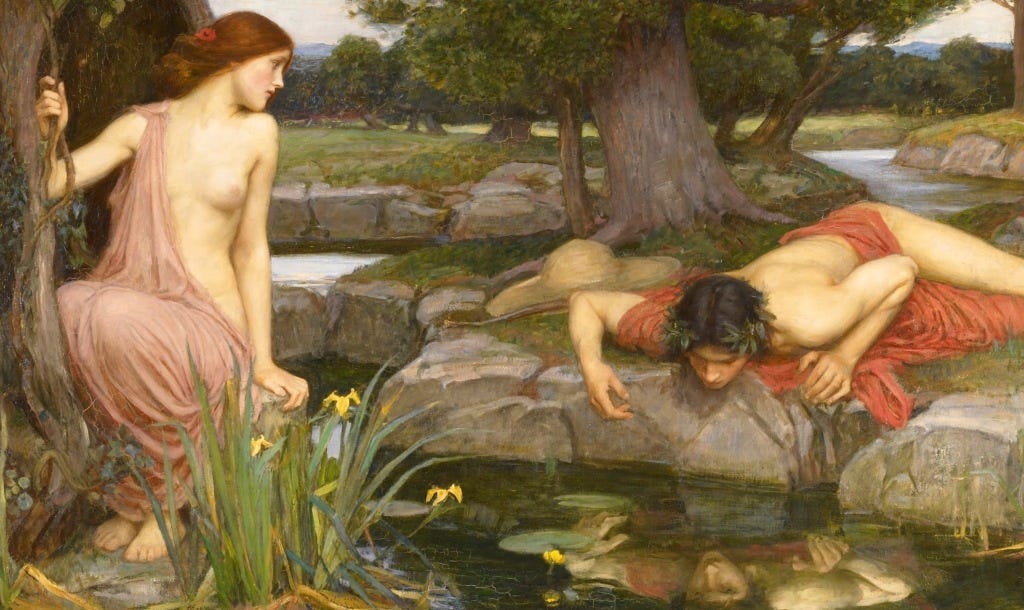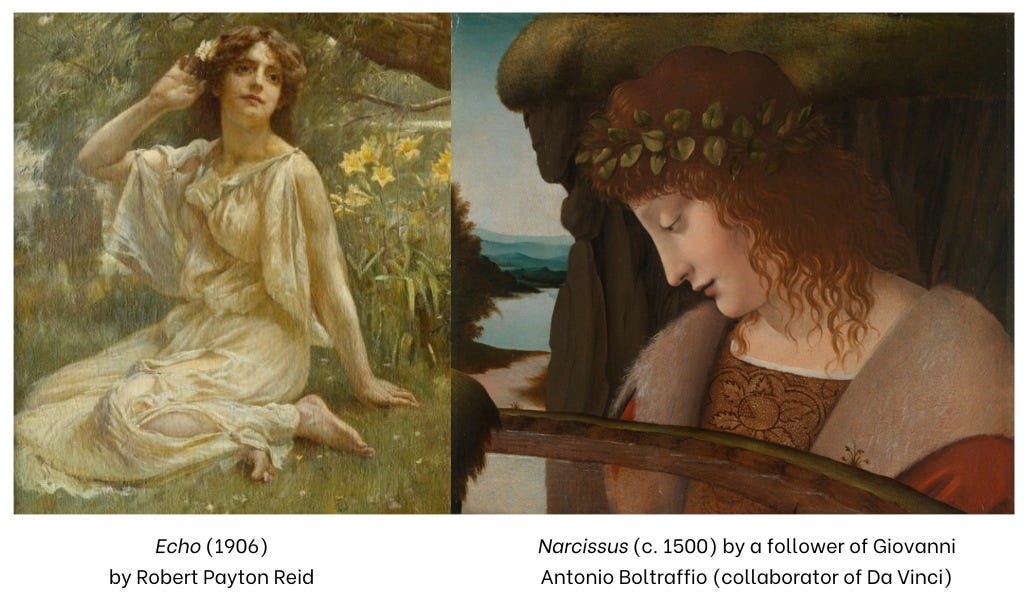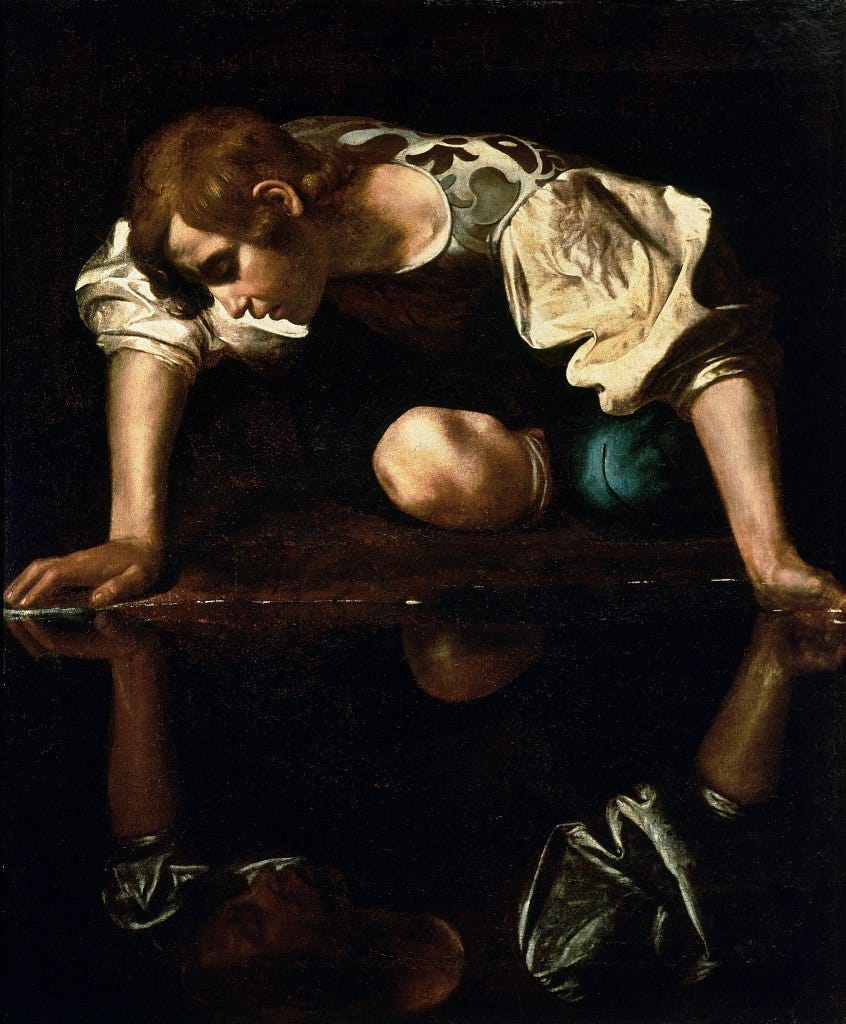Echo & Narcissus Myth
At a young age, I remember learning about Narcissus, the mythical young man who fell in love with his own reflection.
It seems even more popular now with the widespread discussion of narcissism and narcissistic abuse on social media.
But did you know there was another main character in the myth of Narcissus?
The forgotten co-star of the tale is a nymph named Echo. I only recently discovered her once I began my research on codependency a year ago.
There is a modern psychological trait based upon Echo, called echoism. This trait can be measured and people who score highly are called echoists.
Echoists have an extreme fear of being the center of attention, a tendency to avoid praise, and a strong desire to please others while neglecting one's own needs.
Echoism is often seen as the opposite of narcissism, where individuals have difficulty asserting themselves or accepting recognition.
You can read more in this article: 9 Things Everyone Should Understand About Echoists. The article is by Craig Malkin, PhD, an echoism and narcissism expert, clinical psychologist, and lecturer for Harvard Medical School.
Quick Myth Summary
After discovering her involvement in hiding her husband’s (Jupiter) extramarital affairs, Juno cursed the nymph Echo to only repeat the last words spoken by others, leaving her unable to express her own feelings.
Narcissus, born to nymph Liriope and river god Cephisus, was destined for a long life if, and only if, he never saw his reflection.
Narcissus, a breathtakingly beautiful but proud young man, harshly rejected Echo when she tried to approach him, causing her to wither away until only her voice remained.
Narcissus’s many spurned lovers invoked Nemesis to curse him with unfulfillable love, leading him to become infatuated with his own reflection in a spring.
Consumed by love for his reflection, Narcissus eventually died by the stream, and a yellow flower bloomed in his place, symbolizing his eternal self-obsession.
The Birth of Narcissus & The Prophecy
Narcissus was born of a nymph and a river god. His mother, the blue-eyed water nymph Liriope, was cherished for her ethereal beauty, while his father, Cephisus, was a powerful river god who governed the waters of the land. From his parents, Narcissus inherited an extraordinary charm and unparalleled physical allure.
After his birth, Liriope consulted a fortune teller about her son. When asked about his fate and whether he was destined to reach a ripe old age, the prophet explained, “Only if he never comes to recognize himself.” For a long time, the soothsayer’s words seemed nonsensical. However, the circumstances of his death and the unusual nature of his madness ultimately validated the prophecy.
Juno’s Suspicion and Echo’s Curse
Meanwhile, there was another tale brewing between Juno (Hera in Greek Mythology), her husband Jupiter (Zeus in Greek Mythology) and a talkative nymph named Echo. Jupiter was widely known for his indulgence in extramarital affairs. Equally, Juno known for her jealous outrage over them, often seeking revenge.
For instance, upon discovering Callisto’s affair with Jupiter, she transformed Callisto into a bear. Similarly, she sought retribution against Hercules, Jupiter’s illegitimate son with Alcmene, tormenting him throughout his life. Juno delayed his birth, sent snakes to his crib, and ultimately drove him to madness, leading him to tragically kill his wife and children.
Jupiter often visited the mountains, where he sought refuge and relaxation amongst the nymphs there. However, his wife Juno, ever suspicious of Jupiter’s escapades, tirelessly tried to catch him with his nymph companions.
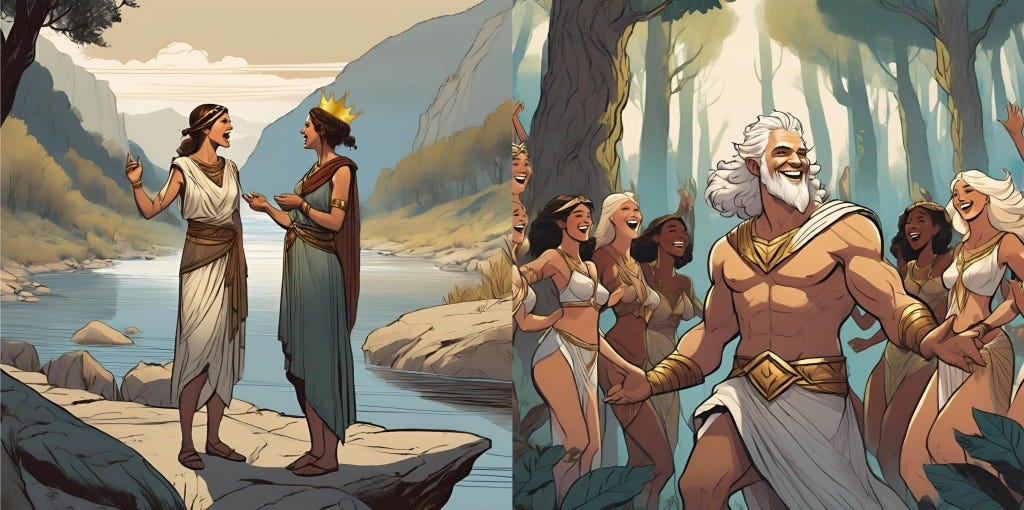
Among these nymphs was Echo. She engaged Juno in lengthy conversations and diversions, successfully keeping her occupied for a time in order to help Jupiter escape unnoticed. Unfortunately, Juno’s shrewdness prevailed, and she eventually discovered the trick. Enraged by Echo’s role in aiding Jupiter’s frequent infidelities, Juno cursed Echo to only repeat the last words spoken by others, stripping her of her ability to speak freely. This curse was a harsh punishment, leaving Echo unable to communicate her own thoughts and feelings, forever doomed to echo the voices of others.
The Fateful Encounter of Narcissus and Echo
Now we return to Narcissus. The son of Cephisus had now reached the age of fifteen, a stage where he could be considered both a boy and a young man. Many youths and maidens pursued him, but his youthful pride in his beauty was so intense that neither male nor female admirers could affect him.
One day, ready for a stag hunting trip, Narcissus entered the forest with a group of attendants. Soon after, Echo saw Narcissus wandering among the trees. She immediately fell in love with him, and discreetly began to follow his steps. The closer she got, the more intensely she burned with passion. Oh, how she longed to approach him with tender, loving words. But all she could do was wait for him to speak so she could return his words back to him.
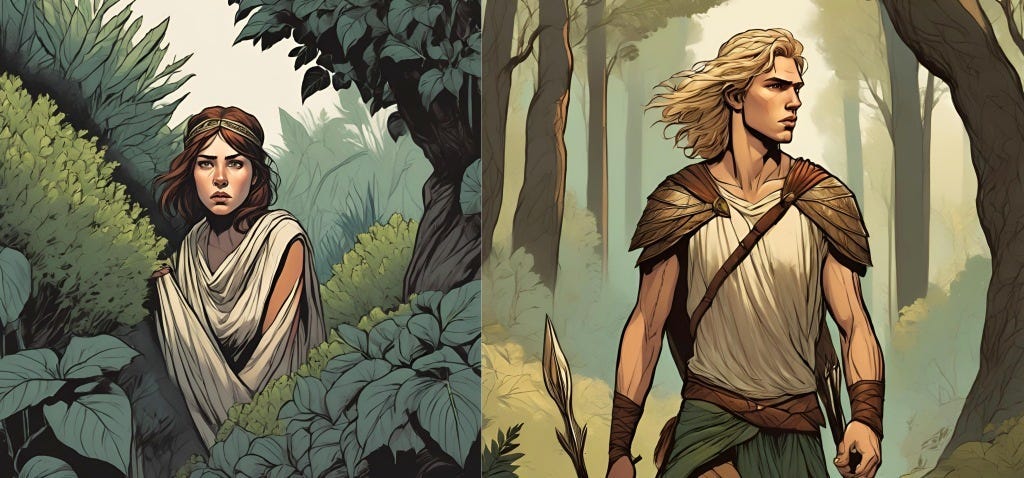
By chance, Narcissus found himself separated from the hunting party. All alone he cried out, “Is there anyone here?” Echo responded, “Here!” Startled, he looked around and called out louder, “Come!” Echo, mimicking his call, responded again, “Come!” Narcissus glanced around and, seeing no one, asked, “Why do you avoid me?” Each word he spoke was mirrored perfectly. “Why do you avoid me?”
Annoyed and irritated, Narcissus called out, “Let us meet here.” Echo, eager to respond, replied, “Let us meet here!” She rushed from the woods, ready to embrace the youth she had longed for. He fled, shouting, “Remove your hands from me; I would rather die than be with you.” She replied only, “Be with you.”
Echo’s Transformation and The Curse of Narcissus
After being rejected, Echo retreated into the woods, concealing her blushing face with green leaves. She began dwelling in lonely caves, her love intensifying despite the heartache. Over time, her body withered; she grew thinner, and her energy seemed to vanish. Her bones turned to stones, leaving only her voice behind. Though no one could she her, Echo stayed in the mountains, her voice continuing to echo everywhere; the sole part of her that endured.
And so Echo joined the countless rank of Narcissus’s spurned lovers, young women and men alike. Some of these angry, heartbroken souls then thought to call upon Rhamnusia (aka Nemesis), the Goddess of revenge and retribution. With hearts full of loathing toward Narcissus, they called out, “May he love, but never enjoy what he loves!” Rhamnusia found the plea just and granted it.
The Allure of the Spring
One day on another hunting trip, Narcissus came upon a pristine spring, as clear as silver. No birds or wild beasts had disturbed it, nor had any fallen branches marred its purity. Sheltered by a dense wood that shielded it from the sun’s rays, the spring remained cool and inviting.
Here, the weary youth, exhausted from the labor of hunting and the oppressive heat, lay down, captivated by the serene beauty of the spot and the allure of the spring. As he bent to quench his thirst, he found himself consumed by a deeper, insatiable longing.
The Futile Pursuit
As he drank, he became mesmerized by his own reflection in the water. Mistaking it for a real person, he became infatuated with the illusion. Amazed by his own image, he stayed still, like a statue. Lying there, he stared at his star-like eyes, his graceful fingers, his Apollo-like hair, his youthful cheeks, ivory neck, elegant mouth, and flawless complexion. Unknowingly, he longed for himself; the one he approved of was the one being approved.
In this pursuit, he was both the hunter and the hunted, consumed by desire and ignited by passion. How often did he press futile kisses to the deceptive spring? How often did he stretch his arms, trying to embrace the neck he saw, only to grasp at empty water? He didn’t comprehend what he beheld, yet it enflamed him; the very illusion that deceived his eyes also fueled his desire. The sight he cherished was merely a shadow, a reflection without substance.
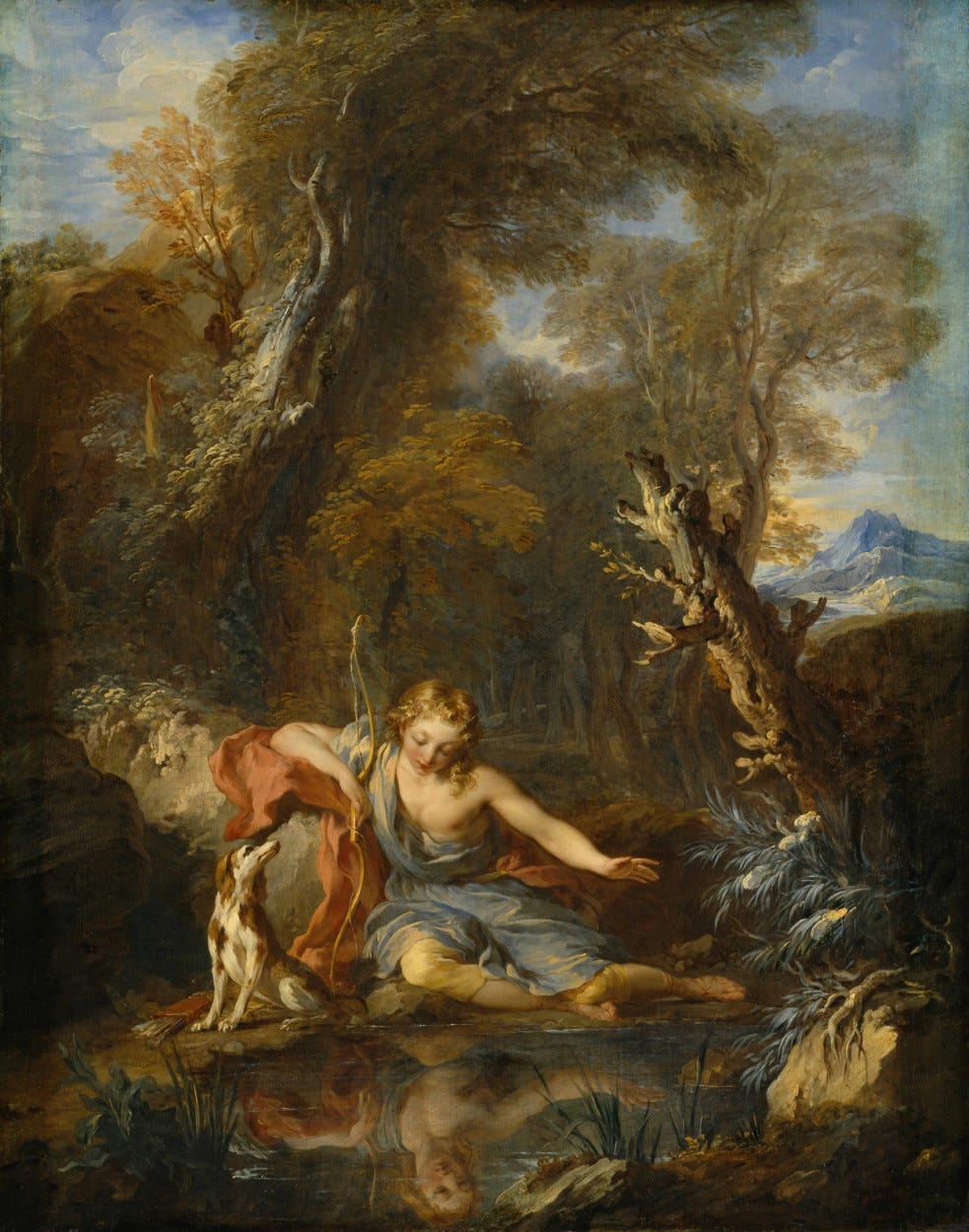
Despair and Decline
Narcissus could not be distracted by food or rest. All he could do was stare at his own reflection with desperate, hungry eyes. He longed for the embrace of the youth in the crystal stream, who mirrored his every move. Despite sharing smiles, tears, and gestures, the reflected youth remained silent and out of reach, deepening Narcissus’s yearning and confusion.
As Narcissus continued to grapple with his unfilled desire, his despair deepened. He began to wish he could leave his own body. He wished for a lover who was separate from himself. Grief was draining all his energy. He realized that despite his youth, his life was almost over. Death, Narcissus thought, would be a relief. But if only his beloved reflection could live longer…
Like wax melting by fire or frost in the morning sun, Narcissus wasted away, consumed by love and gradually withering from within. His complexion lost its color, his strength and looks faded, and even his body, once adored by Echo, was deteriorating. Yet, when the disembodied Echo came upon Narcissus now, she felt sorrow, despite still feeling hurt by his past actions.
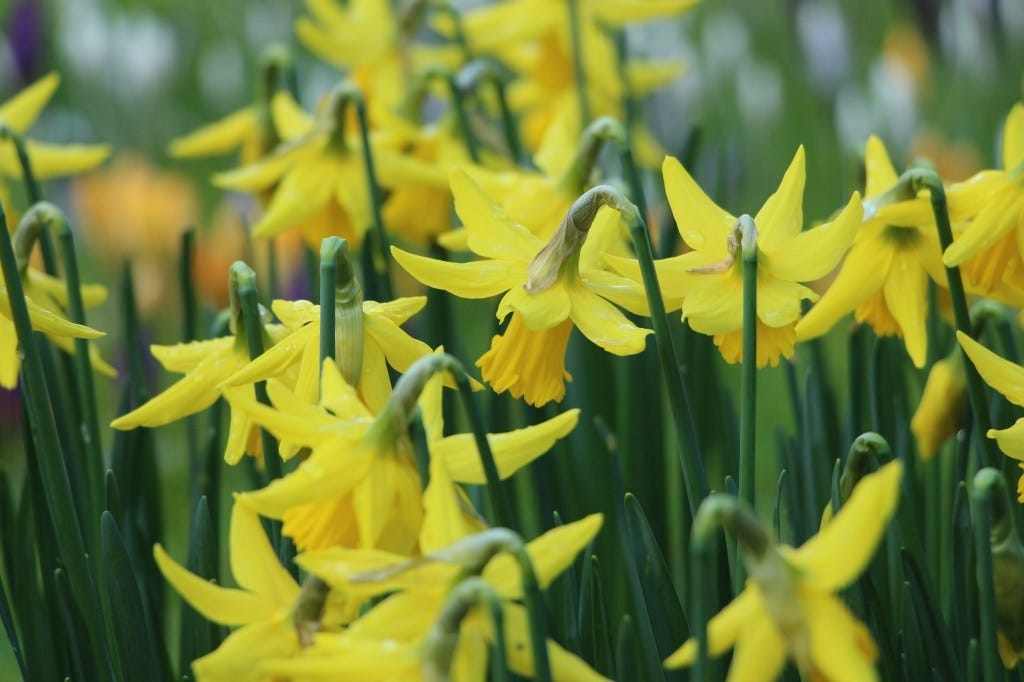
The End of Narcissus
The fading Narcissus gazed into the water one last time. His final words rasped out, “Ah, youth, loved in vain! Farewell!” Echo replied, “Farewell!” Narcissus rested his weary head upon the green grass, and as night fell, Narcissus too closed his eyes for good. His water nymph sisters mourned him, laying their cut hair over their brother; the tree nymphs also grieved, and Echo echoed their cries. As they prepared the funeral pyre, they couldn’t find his body. Instead, a yellow flower (now known as the Narcissus) had taken his place, leaning over the clear, pristine spring.
It is said that even after he descended into the underworld, Narcissus has still continued to gaze at his reflection in the dark waters of the River Styx.



